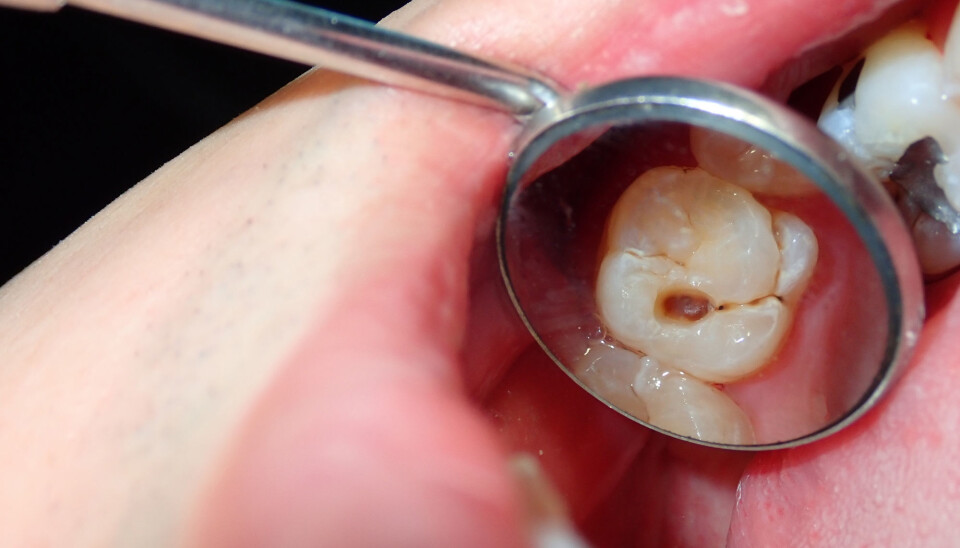
Are some people more prone to getting cavities than others?
ASK A RESEARCHER: Both genes and the environment play a role in how likely you are to get cavities. But the most important thing is how you take care of your gums.
Once and for all: Does the way we brush our teeth really make a difference?
Or are some people simply more prone to cavities?
“In dentistry, we talk about the three pillars when it comes to cavities,” says Qalbi Khan. Khan is an associate professor of oral anatomy at UiT — The Arctic University of Norway in Tromsø.
The host, bacteria, sugar and acid
The first of the three pillars that Khan talks about is you. And me, and everyone else who has teeth. Researchers refer to us as the teeth’s "host".
How our teeth are placed and shaped has a bearing on how prone we are to getting cavities — or caries, which is what dentists call them. Maybe you have teeth that are very close together, where it’s easy for leftover food to get stuck? Bacteria will eagerly feast on these stranded leftovers.

The second pillar is the bacteria that settle on our teeth. They actually create cavities. You can even see the bacteria — in a way. They can be seen as plaque.
The third pillar is sugar. This is the prerequisite for bacteria to be able to do anything. The more sugar, the more acid the bacteria can produce. And the acid is powerful enough to etch holes in the strongest material in our body, the enamel on our teeth.
So let's say you only eat sugar on the weekends and are diligent with your toothbrush, floss and mouthwash. Everything points to your three pillars being solid.
Then the question becomes: how much does genetics have a say when it comes to developing cavities?
Genes or environment?
“This is a question that classically revolves around whether it’s your genes or environment that matters most,” Khan says.
We can influence the environmental factors ourselves.
“This is something that can be kept in check with our saliva, brushing our teeth and the right diet. This is crucial to preventing cavities,” he said.
So let's take a look at the first pillar: you and me. How much do we as hosts affect cavity development — aside from us watching our diet and brushing our teeth?
“It has been shown that genetic factors can make some of us more prone to being more severely affected by caries,” Khan says.
He offers a thought experiment.
“If both you and I take care of our teeth, brush them well and have a proper diet, then neither of us should suffer a lot from caries,” he said. “But what happens if both you and I stop brushing our teeth? Then I may be affected more than you, if I am genetically predisposed to get cavities.”
At the same time, environmental factors can override genetic factors, he believes.
Some people have weaker enamel
“There’s no one mutation in a specific gene that determines whether or not you get caries,” Khan said.
It's more complex than that. For example, your enamel might be the problem. Should you be unlucky enough to have a mutation in a gene that makes your enamel weaker, it will be easier for the acid from bacteria to eat through it.
“Genes also have a say in your immune response, which can affect the bacterial flora in your mouth. And the same goes for genes that code for taste experience and which can lead to me becoming more fond of sweets than you,” he said.
And then we have genes that can affect the production of spit — or more properly, saliva. This also affects how prone you are to caries.
If your mouth is too dry, you are also more likely to develop caries. Also, some people have saliva that is more protective when it comes to bacteria and caries.
In an article in the national newspaper Aftenposten (in Norwegian) earlier this year, Khan pointed out how significant the negative effects of having a dry mouth can be. He also writes that Dutch researchers recently discovered a completely new salivary gland.
Fluoride is an essential ingredient in the fight against caries
Fluoride toothpaste, fluoride tablets and fluoride rinses. Dentists talk about fluoride all the time.
Fluoride is a superpower when it comes to dental health, Khan said.
He talks about this as if there are evil forces trying to make cavities in our teeth. One might be a sugar-happy host who is lethargic about teeth brushing, and thus gives free rein to the bacteria.
There are also good forces, like saliva, a diet that contains little sugar, as well as good tooth-brushing habits. And fluoride.
A fight between good and evil
Ultimately, you could see this as a kind of fist fight between the two extremes.
“Fluoride is the winner in the fist fight between cavities and no cavities. It both helps to disrupt plaque formation, and sticks to the enamel and makes it much harder and more resistant,” Khan.
However, it must be used with care, Khan points out. Basically, people should stick with regular fluoride toothpaste, unless their dentist recommends otherwise.
Fluoride is dangerous in large doses. According to an article on forskning.no from 2013 (in Norwegian), it is estimated that eating a tube of toothpaste can cause fluoride poisoning, marked by nausea, abdominal pain and vomiting.
All it takes is 6.5 tubes of toothpaste to make a life-threatening dose. Fortunately, it isn’t particularly tempting to eat that much toothpaste.
More research on the way
In 2017, forskning.no wrote an article (in Norwegian) about a streptococcal mutant, Streptococcus mutans, that one in five is unlucky enough to have living in their mouth.
"Almost a thousand different bacteria can be found in the oral cavity," says Khan.
But it is still Streptococcus mutans that is the biggest "bad boy" and is most studied with regard to caries, he says.
But the nearly thousand other bacteria haven’t been ignored, either, he said.
“We live in a time where we are very interested in all these bacteria. Now there are more and more suggestions that it’s not just one bacterium that causes the problem, but the interaction between many,” he said.
The field is very exciting right now, Khan says. Because even though there has been an ongoing discussion of these issues for some time, the big studies are long overdue. Now more research is on the way.
“Intestinal bacteria have been shown to have a lot to say for how our digestion works. And I think it will turn out that the interaction between microbes in the mouth also has more to say in the development of cavities — and treatments — than we previously thought,” he said.
Translated by Nancy Bazilchuk






























